About this course
Improve your knowledge of history and literature in English by studying them together. You could read fiction from Africa to help you understand European political history. You could gain new insights into the reign of James I by immersing yourself in the theatre of his time. A year abroad will enhance your studies and let you experience a new culture.
History at Southampton covers the ancient world to the present day. Our English modules explore writing from around the world and its connection to politics, the arts, identity and more.
With our advice, you can shape your degree to suit your own development. For example, you can:
- learn to write screenplays
- study Victorian sensation fiction
- take several modules on the history and literature of oceans
Your studies will include critical analysis, presentations and group work. These will help you develop your conceptual thinking, communication and research skills.
You can take modules that support your year abroad, such as a modern language or European politics.
Our year abroad partner universities in Europe include:
- Barcelona
- Prague
- Frankfurt
- Lausanne
You can also choose universities outside Europe, including locations in:
- the United States
- Canada
- Australia
- South Korea
As part of this course you can:
- join one of 40 student-led performing arts groups
- take part in writing workshops at Nuffield Southampton Theatres
- use a unique collection of rare books at the Chawton House Library
- explore experimental writing with our Entropics events
- get one-to-one tutorials on writing from our Royal Literary Fund Fellows
You can deepen your links to our History community by:
- joining the dynamic, student-run History Society
- use one of the largest Jewish document centres in Europe, the Parkes Archive
We regularly review our courses to ensure and improve quality. This course may be revised as a result of this. Any revision will be balanced against the requirement that the student should receive the educational service expected. Find out why, when, and how we might make changes.
Our courses are regulated in England by the Office for Students (OfS).
What's it like to study English and History at Southampton
Learn more about these subject areas
Course location
This course is based at Avenue.
Awarding body
This qualification is awarded by the University of Southampton.
Download the Course Description Document
The Course Description Document details your course overview, your course structure and how your course is taught and assessed.
Entry requirements
For Academic year 202425
A-levels
ABB including an essay writing subject
A-levels additional information
Essay writing subjects include: History, English Language and Literature, English Language, English Literature, Drama and Theatre Studies, Modern Languages, Philosophy, Religious Studies, Classical Civilisation, Politics, Geography, Sociology, Latin or any other humanities-based essay writing subjects.
A-levels with Extended Project Qualification
If you are taking an EPQ in addition to 3 A levels, you will receive the following offer in addition to the standard A level offer: BBB including an essay writing subject, and grade A in the EPQ
A-levels contextual offer
We are committed to ensuring that all applicants with the potential to succeed, regardless of their background, are encouraged to apply to study with us. The additional information gained through contextual data allows us to recognise an applicant's potential to succeed in the context of their background and experience. Applicants who are highlighted in this way will be made an offer which is lower than the typical offer for that programme, as follows:
BBB including an essay writing subject
International Baccalaureate Diploma
Pass, with 32 points overall with 16 points at Higher Level, including 5 at Higher Level in an essay writing subject
International Baccalaureate Diploma additional information
Essay writing subjects include: History, English Language and Literature, English Language, English Literature, Drama and Theatre Studies, Modern Languages, Philosophy, Religious Studies, Classical Civilisation, Politics, Geography, Sociology, Latin or any other humanities-based essay writing subjects.
International Baccalaureate contextual offer
We are committed to ensuring that all learners with the potential to succeed, regardless of their background, are encouraged to apply to study with us. The additional information gained through contextual data allows us to recognise a learner’s potential to succeed in the context of their background and experience. Applicants who are highlighted in this way will be made an offer which is lower than the typical offer for that programme.
International Baccalaureate Career Programme (IBCP) statement
Offers will be made on the individual Diploma Course subject(s) and the career-related study qualification. The CP core will not form part of the offer. Where there is a subject pre-requisite(s), applicants will be required to study the subject(s) at Higher Level in the Diploma course subject and/or take a specified unit in the career-related study qualification. Applicants may also be asked to achieve a specific grade in those elements. Please see the University of Southampton International Baccalaureate Career-Related Programme (IBCP) Statement for further information. Applicants are advised to contact their Faculty Admissions Office for more information.
BTEC
Distinction, Distinction in the BTEC National Extended Diploma plus B in an A level essay writing subject* or Distinction, Distinction in the BTEC National Diploma plus B in an A level essay writing subject* or Distinction in the BTEC National Extended Certificate plus AB in an A level essay writing subject* and one further A level
RQF BTEC
We are committed to ensuring that all learners with the potential to succeed, regardless of their background, are encouraged to apply to study with us. The additional information gained through contextual data allows us to recognise a learner’s potential to succeed in the context of their background and experience. Applicants who are highlighted in this way will be made an offer which is lower than the typical offer for that programme.
Additional information
Offers typically exclude General Studies and Critical Thinking. Essay writing subjects include: History, English Language and Literature, English Language, English Literature, Drama and Theatre Studies, Modern Languages, Philosophy, Religious Studies, Classical Civilisation, Politics, Geography, Sociology, Latin or any other humanities-based essay writing subjects.
QCF BTEC
Distinction, Distinction in the BTEC Extended Diploma plus B in an A level essay writing subject* or Distinction, Distinction in the BTEC Diploma plus B in an A level essay writing subject* or Distinction in the BTEC Subsidiary Diploma plus AB in an A level essay writing subject* and one further A level
We are committed to ensuring that all learners with the potential to succeed, regardless of their background, are encouraged to apply to study with us. The additional information gained through contextual data allows us to recognise a learner’s potential to succeed in the context of their background and experience. Applicants who are highlighted in this way will be made an offer which is lower than the typical offer for that programme.
Access to HE Diploma
60 credits with a minimum of 45 credits at Level 3, of which 30 must be at Distinction and 15 credits at Merit, to include 6 Distinctions in an essay writing subject
Access to HE additional information
Offers typically exclude General Studies and Critical Thinking. Essay writing subjects include: History, English Language and Literature, English Language, English Literature, Drama and Theatre Studies, Modern Languages, Philosophy, Religious Studies, Classical Civilisation, Politics, Geography, Sociology, Latin or any other humanities-based essay writing subjects.
Irish Leaving Certificate
Irish Leaving Certificate (first awarded 2017)
H1 H2 H2 H2 H3 H3 -including an essay writing subject
Irish Leaving Certificate (first awarded 2016)
A2 A2 A2 B1 B1 B1 including an essay writing subject
Irish certificate additional information
Offers typically exclude General Studies and Critical Thinking. Essay writing subjects include: History, English Language and Literature, English Language, English Literature, Drama and Theatre Studies, Modern Languages, Philosophy, Religious Studies, Classical Civilisation, Politics, Geography, Sociology, Latin or any other humanities-based essay writing subjects.
Scottish Qualification
Offers will be based on exams being taken at the end of S6. Subjects taken and qualifications achieved in S5 will be reviewed. Careful consideration will be given to an individual’s academic achievement, taking in to account the context and circumstances of their pre-university education.
Please see the University of Southampton’s Curriculum for Excellence Scotland Statement (PDF) for further information. Applicants are advised to contact their Faculty Admissions Office for more information.
Cambridge Pre-U
D3 M2 M2 in three principal subjects including an essay related subject.
Cambridge Pre-U additional information
Offers typically exclude General Studies and Critical Thinking. Essay writing subjects include: History, English Language and Literature, English Language, English Literature, Drama and Theatre Studies, Modern Languages, Philosophy, Religious Studies, Classical Civilisation, Politics, Geography, Sociology, Latin or any other humanities-based essay writing subjects.
Welsh Baccalaureate
ABB from 3 A levels including an essay writing subject, or AB from two A levels including an essay writing subject and B from the Advanced Welsh Baccalaureate Skills Challenge Certificate
Welsh Baccalaureate additional information
Offers typically exclude General Studies and Critical Thinking. Essay writing subjects include: History, English Language and Literature, English Language, English Literature, Drama and Theatre Studies, Modern Languages, Philosophy, Religious Studies, Classical Civilisation, Politics, Geography, Sociology, Latin or any other humanities-based essay writing subjects.
Welsh Baccalaureate contextual offer
We are committed to ensuring that all learners with the potential to succeed, regardless of their background, are encouraged to apply to study with us. The additional information gained through contextual data allows us to recognise a learner’s potential to succeed in the context of their background and experience. Applicants who are highlighted in this way will be made an offer which is lower than the typical offer for that programme.
T-Level
Not accepted for this course.
Other requirements
GCSE requirements
Applicants must hold GCSE English language (or GCSE English) (minimum grade 4/C) and mathematics (minimum grade 4/C)
Find the equivalent international qualifications for our entry requirements.
English language requirements
If English isn't your first language, you'll need to complete an International English Language Testing System (IELTS) to demonstrate your competence in English. You'll need all of the following scores as a minimum:
IELTS score requirements
- overall score
- 6.5
- reading
- 6.0
- writing
- 6.0
- speaking
- 6.0
- listening
- 6.0
We accept other English language tests. Find out which English language tests we accept.
You might meet our criteria in other ways if you do not have the qualifications we need. Find out more about:
- our Access to Southampton scheme for students living permanently in the UK (including residential summer school, application support and scholarship)
- skills you might have gained through work or other life experiences (otherwise known as recognition of prior learning)
Find out more about our Admissions Policy.
For Academic year 202526
A-levels
AAB including an essay writing subject
A-levels additional information
Essay writing subjects include: History, English Language and Literature, English Language, English Literature, Drama and Theatre Studies, Modern Languages, Philosophy, Religious Studies, Classical Civilisation, Politics, Geography, Sociology, Latin or any other humanities-based essay writing subjects.
A-levels with Extended Project Qualification
If you are taking an EPQ in addition to 3 A levels, you will receive the following offer in addition to the standard A level offer: ABB including an essay writing subject, and grade A in the EPQ
A-levels contextual offer
We are committed to ensuring that all applicants with the potential to succeed, regardless of their background, are encouraged to apply to study with us. The additional information gained through contextual data allows us to recognise an applicant's potential to succeed in the context of their background and experience. Applicants who are highlighted in this way will be made an offer which is lower than the typical offer for that programme.
International Baccalaureate Diploma
Pass, with 34 points overall with 17 points at Higher Level, including 5 at Higher Level in an essay writing subject
International Baccalaureate Diploma additional information
Essay writing subjects include: History, English Language and Literature, English Language, English Literature, Drama and Theatre Studies, Modern Languages, Philosophy, Religious Studies, Classical Civilisation, Politics, Geography, Sociology, Latin or any other humanities-based essay writing subjects.
International Baccalaureate contextual offer
We are committed to ensuring that all learners with the potential to succeed, regardless of their background, are encouraged to apply to study with us. The additional information gained through contextual data allows us to recognise a learner’s potential to succeed in the context of their background and experience. Applicants who are highlighted in this way will be made an offer which is lower than the typical offer for that programme.
International Baccalaureate Career Programme (IBCP) statement
Offers will be made on the individual Diploma Course subject(s) and the career-related study qualification. The CP core will not form part of the offer. Where there is a subject pre-requisite(s), applicants will be required to study the subject(s) at Higher Level in the Diploma course subject and/or take a specified unit in the career-related study qualification. Applicants may also be asked to achieve a specific grade in those elements. Please see the University of Southampton International Baccalaureate Career-Related Programme (IBCP) Statement for further information. Applicants are advised to contact their Faculty Admissions Office for more information.
BTEC
Distinction, Distinction in the BTEC National Extended Diploma plus A in an A level essay writing subject or Distinction, Distinction in the BTEC National Diploma plus A in an A level essay writing subject or Distinction in the BTEC National Extended Certificate plus A in an A level essay writing subject and A in one further A level
RQF BTEC
We are committed to ensuring that all learners with the potential to succeed, regardless of their background, are encouraged to apply to study with us. The additional information gained through contextual data allows us to recognise a learner’s potential to succeed in the context of their background and experience. Applicants who are highlighted in this way will be made an offer which is lower than the typical offer for that programme.
Additional information
Offers typically exclude General Studies and Critical Thinking. Essay writing subjects include: History, English Language and Literature, English Language, English Literature, Drama and Theatre Studies, Modern Languages, Philosophy, Religious Studies, Classical Civilisation, Politics, Geography, Sociology, Latin or any other humanities-based essay writing subjects.
QCF BTEC
Distinction, Distinction in the BTEC Extended Diploma plus A in an A level essay writing subject or Distinction, Distinction in the BTEC Diploma plus A in an A level essay writing subject or Distinction in the BTEC Subsidiary Diploma plus A in an A level essay writing subject and A in one further A level
We are committed to ensuring that all learners with the potential to succeed, regardless of their background, are encouraged to apply to study with us. The additional information gained through contextual data allows us to recognise a learner’s potential to succeed in the context of their background and experience. Applicants who are highlighted in this way will be made an offer which is lower than the typical offer for that programme.
Access to HE Diploma
60 credits with a minimum of 45 credits at Level 3, of which 39 must be at Distinction and 6 credits at Merit, to include 6 Distinctions in an essay writing subject
Access to HE additional information
Offers typically exclude General Studies and Critical Thinking. Essay writing subjects include: History, English Language and Literature, English Language, English Literature, Drama and Theatre Studies, Modern Languages, Philosophy, Religious Studies, Classical Civilisation, Politics, Geography, Sociology, Latin or any other humanities-based essay writing subjects.
Irish Leaving Certificate
Irish Leaving Certificate (first awarded 2017)
H1 H2 H2 H2 H2 H2 -including an essay writing subject
Irish Leaving Certificate (first awarded 2016)
A2 A2 A2 B1 B1 B1 including an essay writing subject
Irish certificate additional information
Offers typically exclude General Studies and Critical Thinking. Essay writing subjects include: History, English Language and Literature, English Language, English Literature, Drama and Theatre Studies, Modern Languages, Philosophy, Religious Studies, Classical Civilisation, Politics, Geography, Sociology, Latin or any other humanities-based essay writing subjects.
Scottish Qualification
Offers will be based on exams being taken at the end of S6. Subjects taken and qualifications achieved in S5 will be reviewed. Careful consideration will be given to an individual’s academic achievement, taking in to account the context and circumstances of their pre-university education.
Please see the University of Southampton’s Curriculum for Excellence Scotland Statement (PDF) for further information. Applicants are advised to contact their Faculty Admissions Office for more information.
Cambridge Pre-U
D3 D3 M2 in three principal subjects including an essay related subject.
Cambridge Pre-U additional information
Offers typically exclude General Studies and Critical Thinking. Essay writing subjects include: History, English Language and Literature, English Language, English Literature, Drama and Theatre Studies, Modern Languages, Philosophy, Religious Studies, Classical Civilisation, Politics, Geography, Sociology, Latin or any other humanities-based essay writing subjects.
Welsh Baccalaureate
AAB from 3 A levels including an essay writing subject, or AA from two A levels including an essay writing subject and B from the Advanced Welsh Baccalaureate Skills Challenge Certificate
Welsh Baccalaureate additional information
Offers typically exclude General Studies and Critical Thinking. Essay writing subjects include: History, English Language and Literature, English Language, English Literature, Drama and Theatre Studies, Modern Languages, Philosophy, Religious Studies, Classical Civilisation, Politics, Geography, Sociology, Latin or any other humanities-based essay writing subjects.
Welsh Baccalaureate contextual offer
We are committed to ensuring that all learners with the potential to succeed, regardless of their background, are encouraged to apply to study with us. The additional information gained through contextual data allows us to recognise a learner’s potential to succeed in the context of their background and experience. Applicants who are highlighted in this way will be made an offer which is lower than the typical offer for that programme.
T-Level
Not accepted for this course.
Other requirements
GCSE requirements
Applicants must hold GCSE English language (or GCSE English) (minimum grade 4/C) and mathematics (minimum grade 4/C)
Find the equivalent international qualifications for our entry requirements.
English language requirements
If English isn't your first language, you'll need to complete an International English Language Testing System (IELTS) to demonstrate your competence in English. You'll need all of the following scores as a minimum:
IELTS score requirements
- overall score
- 6.5
- reading
- 6.0
- writing
- 6.0
- speaking
- 6.0
- listening
- 6.0
We accept other English language tests. Find out which English language tests we accept.
You might meet our criteria in other ways if you do not have the qualifications we need. Find out more about:
- our Access to Southampton scheme for students living permanently in the UK (including residential summer school, application support and scholarship)
- skills you might have gained through work or other life experiences (otherwise known as recognition of prior learning)
Find out more about our Admissions Policy.
Got a question?
Please contact our enquiries team if you're not sure that you have the right experience or qualifications to get onto this course.
Email: enquiries@southampton.ac.uk
Tel: +44(0)23 8059 5000
Course structure
You’ll explore literature in English, starting in the medieval era. You'll study history from the ancient world up to the present day. Both subjects include modules that focus on other countries and cultures.
You'll have a huge amount of choice about how and what you learn. For example, you could take several modules in Russian history or creative writing.
Each year you can take modules from subject areas outside of English and History. You do not need to choose your modules when you apply. We'll guide you through the process before you start.
Year 1 overview
You’ll take an equal number of module credits in English and History. You’ll gain a foundation in critical thinking, essay writing and joint research. This will help you develop your own views and approaches in the study of literature.
You’ll take a compulsory module in world histories, and must study 1 History module which covers the period before 1750.
Typical modules cover topics such as:
- the novel
- histories of empire
- poetic language
- world dramas
Year 2 overview
You'll choose all of your modules, keeping a roughly equal balance of English and History topics. We encourage you to take modules from across historical periods.
Modules include topics such as:
- world literature after globalisation
- the Space Age
- African worlds
- witchcraft in England 1542-1736
- how writers influence each other
- women and Hollywood
In the second semester, you’ll take a module to prepare you for your year abroad.
Year 3 overview
You’ll study at one of our partner universities. Your lectures will be in English but you'll have opportunities to develop your language skills.
Alternatively, you can take an approved work placement abroad instead.
You’ll write a monthly personal blog to document your learning. This will record events, activities and intercultural encounters you experience. You’ll write a year abroad report with support from an academic supervisor.
Year 4 overview
You'll take a module examining your experiences abroad. This will help you produce an enhanced CV.
You’ll write a dissertation on a research topic of your choice in either English or History.
You’ll also choose modules from a wide range of topics, including:
- Jane Austen and the Regency world
- the Tudor court
- refugees in the 20th Century
- the East India Company and Britain’s Asian world
- radical England from Shakespeare to Milton
- literature of islands and oceans
- narrative non-fiction
Want more detail? See all the modules in the course.
Modules
The modules outlined provide examples of what you can expect to learn on this degree course based on recent academic teaching. As a research-led University, we undertake a continuous review of our course to ensure quality enhancement and to manage our resources. The precise modules available to you in future years may vary depending on staff availability and research interests, new topics of study, timetabling and student demand. Find out why, when and how we might make changes.
Year 1 modules
You must study the following modules in year 1:
English on the Move
English has always been on the move. As a literary language, it has not only travelled from and back to England; lines of influence between texts, authors, publishers, editors, book technologies, and readers traverse the globe in multiple directions, bet...
History Matters (Object, Image, Text)
History is not just about studying written documents and sources; historians examine the ‘stuff’ of history, including objects, images, and buildings which were made and used by people in the past. We can also ‘read’ these sources, if we know how to appro...
The Novel
‘A novel does not assert anything; a novel searches and poses questions’. The contemporary novelist Milan Kundera describes the novel as an exploratory and engaging form, a way of telling stories that involves readers both in its searches and in the quest...
World Histories Introduced
In this history department, we have historians working on periods from the ancient world to the contemporary moment, covering the whole world (and beyond!) and working on themes like gender, politics, environment, and technology. This module covers a rang...
You must also choose from the following modules in year 1:
Castles: Military technology and social change from the middle ages to the modern
The castle was one of the most characteristic creations and symbols of the middle ages. They were advanced military technology which supported a range of functions; they dominated populations and secured conquests; they were garrisons, centres of governme...
From Constantine to Theodosius: Christians, Pagans and Emperors
The 4th century CE was a time of upheaval and change. Christianity became established as the state religion of the Roman empire, the split between the eastern and western empire was cemented, and the first large group of Goths crossed the Roman border. In...
From Shah to Ayatollah: The Establishment of the Clerical Power in Iran (1979 to Today)
The 1979 Revolution unexpectedly established a clerical regime in Iran for the first time in its history. What were the roots and consequences of this Revolution? This module surveys this history from an anti-Shah movement initiated by university students...
Introduction to Ethnography: Food and Culture
Biological science tells us what items in our world are potentially edible, but culture decides what constitutes food. Culture informs us as to whether a specific item is appropriate, appetising, valued, desirable, prohibited, restricted, staple or medici...
Landscapes and Seascapes of Britain’s Past
The landscapes and seascapes of Britain play host to one of the world’s most varied and intriguing archaeological records. With an occupational history spanning one million years, it tells a complex inter-twined story of social, physical and environmenta...
Literary Transformations
Why have some stories gripped the imagination of writers, musicians, and artists across cultures and centuries? And what does the emergence and constant re-emergence of such stories tell us about ourselves and others, past and present? What do readers and...
Putin and the Politics of Post-Soviet Russia
This module provides an overview of major political, social and economic developments in Russia since 1991, and how they have been informed by a sense of Russian history. After the fall of the Cold War, Russia has found that it is no longer a superpower, ...
Puzzles about Art and Literature
Both individuals and society attach great importance and value to certain works of art, including poems, novels, films, plays, symphonies, and paintings. Most of us spend a considerable amount of our limited time and resources acquiring, creating, experie...
Rebellions and Uprising in the age of the Tudors
The aims of this module are to introduce you to the turbulent sequence of rebellions which took place during the Tudor period, to encourage you to ponder on the causes and consequences of those uprisings, and to help you to understand why previous histori...
Terrorists, Tyrants and Technology: America's "War on Terror"
9/11; jihad; al-Qaeda; War on Terror; Osama bin Laden; Afghanistan; the Taliban; the Bush Doctrine; Iraq; WMDs; waterboarding; targeted killing and drones. America’s War on Terror, launched as a response to the terrorist attacks of September, 11, 2001 has...
The Crimean War
The Crimean War (1853-56) was the most important Great Power conflict fought between the end of the Napoleonic Wars in 1815 and the outbreak of World War One in 1914. Yet its causes are uncertain and the way it was fought was often paradoxical: modern te...
The Invention of English Literature: Medieval to Early Modern
Where did the idea of ‘English Literature’ as we know it today come from? When and how did writers first start thinking of themselves as English authors? How did the mechanisms of book production and the material forms of books shape readers’ understandin...
The Roman Army in Britain: life on the northern frontier
In this module, you will examine one of the greatest armies in European history. The Roman army has long excited interest, whether out of an interest in the past, or as a model for more recent military powers. The far-flung province of Britain hosted the ...
Theory & Criticism
The module asks big questions. What do we do when we interpret literature and culture, and how can we analyse our practices of interpretation? Can anything be a text, and if so what do we understand by ‘literature’? How does literature shape our identity,...
Twentieth-Century China
Few nations had a more dramatic experience of the twentieth century than China. Over the course of this module you will learn about the tumultuous political events of the era - from the fall of the once mighty Qing empire, to China’s descent into chaos du...
Who is Anne Frank?
‘The Diary of Anne Frank’ is the most widely read non-fiction book in the post-war world. The author has become a symbol of Jewish suffering during (what we now term) the Holocaust and a figure emblematic of all victims of the Second World War. Indeed she...
World Dramas
In this module, you will learn how to approach dramatic texts in a way that takes into consideration their place in the world as a complex political, economic, and cultural network. We will focus on questions such as: • What is the difference between r...
Year 2 modules
You must study the following module in year 2:
You must also choose from the following modules in year 2:
Aesthetics and the Philosophy of Art
You might watch a stunning film, hear a delightful song, enjoy a beautiful sunset, read a dreadful poem, attend an elegant dance, or see a garish building. Experiences like this can stimulate thoughts and feelings of great depth, and provide pleasure or d...
African Freedoms and The Novel
In Africa, the ideal of freedom has the capacity to evoke multiple layers of struggle and aspiration: from state decolonisation and the end of official racial segregation, to gendered, national, economic and spiritual freedoms. Historically, the novel has...
Ancient Greek 2
‘Ancient Greek 1B’ is designed to build on the knowledge acquired by students who have taken ‘Ancient Greek 1A’, but may also be appropriate for those with some previous alternative experience (e.g. a GCSE). The module will improve your ability to read, c...
Ancient Greek Language Stage 1A
This is a beginner’s course in Ancient Greek Language with the emphasis on Classical Attic.
Ancient Greeks at War
From the legendary tales of the Trojan War up to the conquest of Persia by Alexander the Great, warfare played a central role in ancient Greek history and society. This module allows you to examine ancient Greek warfare from a range of different sources a...
Ancient Rome: the First Metropolis
This module focusses on the city of Rome and its development from its early foundation through to the third century AD. It explores the evidence for one of the most important cities of the ancient world, which at its height was home to approximately a mil...
Aristocracy to Democracy
In this module we will examine a critical period of political change which saw Britain become more ‘democratic’. But what does ‘democratic’ mean? How are people’s views and interests to be identified and represented? How does a state ensure it is accou...
Blitzed Brits: Politics, Society and Culture in the Second World War
The Second World War ended more than seventy years ago, but the echoes and memories of the war still permeate modern British society, culture and politics. This course will explore the history of the Second World War in Britain, from appeasement to the el...
Brief Encounters: Writing Short Stories
Many writers begin with the short story. Through writing short stories they are able to experiment, learn the fundamentals of narrative composition, and have the satisfaction of completing something to a high standard in a relatively short period of time....
Chaucer and his World
The writings of Geoffrey Chaucer have had a deep and lasting influence on writers in English from the fifteenth to the twenty-first centuries. But every generation since the poet’s death has valued and interrogated different aspects of Chaucer’s works, re...
Children's Literature
Children's literature is a rather slippery term encompassing a variety of genres, child/adult concerns, engagement with historical/contextual issues on, for example, gender; class; nonsense; the nature of time; slavery. Other issues addressed are subject...
Chivalry, c. 1250-1500
Today, chivalry is readily associated with gentle(manly) behaviour, and more specifically with sportsmanship, gallantry and courtesy. While indisputably there has always been a ‘civilising’ component to chivalry, it is fascinating to see how our modern so...
Curating History
This module introduces you to the history of art through the collections of the Southampton City Art Gallery (SCAG). As part of the module, you will curate an art exhibition at SCAG which will be open to the public.
Data Environmentalism
Data is material. It is produced by people, it is made possible by resource extraction, it needs power to survive, it inhabits and resculpts the landscape. The use of data, then, contributes to climate catastrophe, but that role can be hard to see, hidden...
Data, Culture, and Justice
Data organise our present and shape our future. Those data are never neutral because they are the product of human labour, of choices made by people about what data to record, how to record it, and who is best equipped to do that recording. Drawing on wor...
Decolonising Modernity
Literary history is often told in epochs. In particular, it can be useful to understand the world in relation to some or other idea of “modernity”: for example, English literary studies is often organised through conceptions of the early modern, the mode...
Experiment!
What does it mean to make literature new? What forms and reformations have offered starting points for rethinking literary convention? In this module, you will explore the revolutions, innovations, and boundary-crossings that have taken place in literatur...
Film, Realism and Reality: representing the world, from revolution to the everyday
This module will introduce you to some of the principal realist and documentary movements, asking how the simple aim to ‘show things as they really are’ has resulted in a range of creative and wildly different cinematic forms. It will consider the issue a...
From Black and White to Colour: A Screen History of Race, Gender and Sexuality in Post-War Britain
This module presents a history of post-war multicultural Britain through the lens of British film and television, considering how our attitudes to 'race', sexuality and British identity more generally have been defined, challenged and changed by film and...
Great Writers Steal: Creative Writing and Critical Thinking
Many writers have penned essays about fiction and memoir: E.M. Forster, Virginia Woolf, Henry James, Edith Wharton, Italo Calvino, Vladimir Nabokov, Milan Kundera, A.L. Kennedy, A.S. Byatt, to name just a famous few. Indeed, it seems essential at some p...
How the Arts Work: A Practical Introduction to Cultural Economics
How are the arts getting back to work again after Covid-19? This is a critically important question for everyone who cares about them, artists and audiences alike. If you’re a student considering a career in the arts you’ll want to know where fresh opport...
Images of Women
Cultural representations of women shed important light on notions of female subjectivity, sexuality and racial identity in the modern world. Medical discourses on gender, mental pathology and the rise of modern feminism are just some of the pivotal histor...
Immigration, Race and Ethnicity in France
What developments led to the headscarf and the so-called ‘burka ban’ in France? Why has ‘multiculturalism’ been a taboo subject? To what extent have anti-racism associations been a success in combating racism? This module offers you the opportunity to gai...
Imperial China: From China’s mythical emperors to the 19th century
This module will discuss Chinese history from its mythical beginnings to the 19th century (the time when China encountered the West). We will encounter famous figures like the philosopher Confucius, discuss the origins of the Silk Road and the Great Wall,...
Imperialism and Nationalism in British India
How did less than two thousand British officials rule an Indian population of three hundred million? Why did the words gymkhana, bungalow and shampoo enter the English language? What was the significance of the British constructing clock towers in numerou...
Inventing America
This module studies writing and visual representation in the early years of the republic of the United States. Focusing on the period from shortly before the American Revolution to the early years of the nineteenth century, this module will introduce stud...
Islamism – from the 1980s to the present
Since the end of the Soviet invasion of Afghanistan in 1980s, the modern world has witnessed the emergence of Islamist states and powerful Islamist political movements including in West Asia and the Near and Middle East: the Taliban in Afghanistan, the Is...
Jews in Germany before the Holocaust
German-Jewish history has often been regarded as ‘leading up to the Holocaust’. In this module we will explore the life and culture of Jews in Germany from the late C18th until the eve of the Nazi takeover in 1933. Starting with the Jewish enlightenment, ...
McCarthyism
‘I have here in my hand a list of 205 names that were made known to the Secretary of State as being members of Communist Party and who nevertheless are still working and shaping policy in that State Department.' With these words, asserting both the exi...
Myth and the Ancient World
What are myths and what do they do? In “Myth and the Ancient World” you will explore how the Ancient Greeks used myths to make sense of the world and their position in it. The module covers a time span of some 900 years, from the time of Homer and Hesiod ...
Napoleon and his legend
Napoleon Bonaparte (1769-1821) may have been a tyrant in life but he proved to be a surprisingly malleable figure after death. This module traces the emergence in France and Britain of Napoleon’s reputation, whether as tyrant, martial hero, saviour of the...
Nelson Mandela: A South African life
In 1948, Daniel Malan’s National Party took power in South Africa. Malan’s election victory over the Jan Smuts-led United Party and Labour Party alliance was only a slender one, and few of the National Party’s opponents could have envisaged that it would ...
Oil Burns The Hands: Power, Politics and Petroleum in Iraq, 1900-1958
The area we know today as Iraq has long been known for its oil reserves. Natural springs of crude oil had astonished travellers to the Upper Tigris region since Antiquity: a curiosity, unrefined crude was used medicinally, and as a lubricant for cart axle...
Peasants, Empresses and Holy Virgins: Women in Late Antiquity
Late Antiquity can be narrated as a period of powerful emperors, domineering bishops, and barbarian warlords. In this module we will be looking, instead, at the lives and agency of women during the same period. We look at women’s legal and social status a...
Plague, Fire and Popish Plots: The Worlds of Charles II
During his lifetime Charles II was described as charming, indolent and a womaniser, while his court was seen as far more informal than that of his father, Charles I. This module will seek to assess the validity of this view and it will consider the challe...
Puzzles about Art and Literature
Both individuals and society attach great importance and value to certain works of art, including poems, novels, films, plays, symphonies, and paintings. Most of us spend a considerable amount of our limited time and resources acquiring, creating, experie...
Queens, Devils and Players in Early Modern England
Early modern England is a period associated with Elizabeth I and the Tudor court, the plays of Shakespeare, blood and violence on the Jacobean stage, the discovery of new worlds, and the persecution of witches and heretics. The diversity and vitality of t...
Ragtime! The Making of Modern America
For the United States, the turn of the twentieth century was a turbulent, transformative time: an age of embattled political parties and insurgent Populists, mass immigration and overseas war, millionaire capitalists and impoverished farmers, all set to t...
Responses to the Holocaust
This module will explore contemporary and post-war responses to the Holocaust more than 75 years after the liberation of Auschwitz. We will explore a range of responses to the genocide and look at: diaries, oral histories, literature, film, museums and mu...
Romantics and Victorians
In 1831 the philosopher John Stuart Mill struggled to define the ‘Spirit’ of the nineteenth century. ‘It is’, he wrote, ‘an age of transition. Mankind have outgrown old institutions and old doctrines, and have not yet acquired new ones.’ If the nineteenth...
Rome: Politics and Power
The ancient Roman elite was highly competitive, with families and individuals fighting for control and influence in all spheres of social and political life, in elections, in the law courts, in the arenas, theatres, and temples of Rome, and outside of the...
Scriptwriting
Dialogue, pace, setting, and story. Understanding the nuts of bolts of scriptwriting is not only key to a successful piece of theatre, cinema, or radio, but to all forms of creative writing or literary analysis. This course will introduce you to the art o...
Sex, Death and Money: the United Kingdom in the 1960s
The 1960s were a time of rapid social, political and cultural change in Britain. The decade saw Britain – and especially London – finally steal the crown of cool from the United States. British pop culture exploded and was exported around the world. With ...
Sin and Society, 1100-1500
In present-day Europe most of us consider religion a matter of personal choice and private conscience to the point that many are hardly religious at all and our society is increasingly secular. This module will explore how the opposite was largely true in...
Speech Acts
How do writers activate and amplify the sonic properties of language? Why do artists use vocal performance of text in video art? How can text ‘perform’ on the page (or onscreen), and what does it mean for language to be performative? What does writing for...
Stalin and Stalinism
This module begins with an assessment of the legacy of Lenin and goes on to investigate Stalin's rise to power and his methods in modernising economy and society. We will engage with historical debates concerning his role in the purges of the 1930s and th...
Sweatshops, Sex workers, and Asylum Seekers: World Literature and Visual Culture after Globalisation
What can the voices and narratives of sex workers and asylum seekers depicted in world literature and visual culture tell us about the conditions and pressures of life in the contemporary world? How might considerations of narrative technique, genre, and ...
The Age of Discovery? c.1350-c.1650
The Age of Discovery explores the maritime expansion of Europe from c.1350-c.1650 through the experiences of four European states: Portugal; Spain; England and the Netherlands. It therefore covers the transition of these states from medieval polities to R...
The British Atlantic World
This module focuses on the period between about 1600 and 1800, allowing you to explore the development of the British Empire in the Americas from the founding of Jamestown in 1607 up until the American Revolution and its aftermath. The module takes a broa...
The EU and European Identity
The course seeks to provide an overview of the evolution of the European Union (EU) from its early stages to the present. In so doing, it examines the ideas and history of the EU, the institutions of the EU, examples of specific issue areas and the presen...
The Early Modern Body
In this module, students will explore a wealth of different texts and different discourses, from the literary to the scientific, on humanity and the human body in the early modern period. Starting with a glimpse of ancient and modern visions of the body, ...
The First British Empire: the beginnings of English dominance, 1050-1300
By the middle of the eleventh century, the various nations of the British Isles were characterised by quite distinct cultures and political and economic systems and elites. Yet the relationships between the various nations were entirely redrawn between ab...
The Making of Englishness
This module examines changing notions of British (and, more specifically, English) national identity in relation to issues of race, ethnicity and immigration from the 1840s to the present day.
Underworlds: A cultural history of urban nightlife in the 19th and 20th centuries
“On 13 December 1838, on a cold and rainy night, a man of athletic build, dressed in a shabby jacket, crossed the Pont au Change and penetrated into the Cité […]. That night the wind was blowing violently through the alleyways of this dismal neighbourhood...
Vienna and Berlin: Society, Politics and Culture from 1890 to the Present
This module will introduce you to the social, political and cultural history of Vienna and Berlin in the 20th century, German using a wide range of sources which will include literature, film and architecture. Topics covered may include the following:...
When An Empire Falls: Culture and the British Empire, 1914-1960
The twentieth century witnessed a seismic transformation in Britain’s relationship with the rest of the world. In 1914, Britain controlled the largest empire the world had ever seen. By 1960, the majority of Britain’s colonies were independent, or on the ...
Witchcraft in England, 1542-1736
This module offers you the opportunity to study the history of witchcraft in England during the sixteenth and seventeenth centuries (the period during which the great majority of prosecutions and executions for that supposed crime took place). On the modu...
Year 3 modules
You must study the following modules in year 3:
English Dissertation
Undertaking independent research into an aspect of literature or creative writing which particularly interests you is a cornerstone of your degree. A dissertation gives you the opportunity to study a subject in much greater depth than usual and, with gui...
History Dissertation
The dissertation is a key component of your degree; in it you have a chance to show the skills of analysis and research you have learned during the three years of your course.
You must also choose from the following modules in year 3:
Burning Worlds, Drowning Worlds: Oil Cultures, Climate Crisis, and Traumatic Desires in World Literatures
We keep being barraged with a deluge of unnerving news - about environmental crisis, multi-level pollution, exceeding desertification and inundation of centuries-long places of human habitation, floods, forest fires, relentless rise in sea-level due to t...
A Short History of Just War
Wars have been fought throughout the history of mankind. Ethical concerns that they raised, or, in other words, the rights and wrongs of waging war, have been discussed from time immemorial. War has often been seen as an evil, a necessary evil, to be avoi...
A Short History of the Far Right
The resurgence of the far right is one of the most striking and challenging features of the 21st century political landscape. Attitudes and practices that were marginal and unrespectable just decades ago have gained considerable traction, whether measured...
Aesthetics and the Philosophy of Art
You might watch a stunning film, hear a delightful song, enjoy a beautiful sunset, read a dreadful poem, attend an elegant dance, or see a garish building. Experiences like this can stimulate thoughts and feelings of great depth, and provide pleasure or d...
America and the world, 1945-2000: technology, conflict and the lives of others (Part 1)
The history of the post-war world has been powerfully shaped by the decisions and actions of American political and military leaders, and by the deployment of American defense technologies. This module considers the significance of humanitarian concerns w...
America and the world, 1945-2000: technology, conflict and the lives of others (Part 2)
This module continues the exploration of the impact of defense technologies and humanitarian concerns upon US foreign policy from the escalation of US involvement in the Vietnam War into the post-Cold War era. It will examine the US approach to fighting t...
American Cinema Since 1965
The module offers a history of American cinema since 1965, covering the decline of the Hollywood studio system and the moment, from 1968 to 1975, when a new wave of directors produced a number of key films sometimes known as constituting the Hollywood art...
American Gothic
As the Puritan colonialist John Winthrop said at Holyrood Church in Southampton before embarking for Boston, American was to be ‘as a city upon a hill’, a beacon of progress and enlightenment for the world. But from the beginning, America has been shadowe...
An ambivalent asylum: the histories and memories of refugees in early twentieth-century France
Where does the idea of a stateless person come from? Why did France become one of the foremost nations for refugee reception? How were refugees fleeing from persecution in other parts of Europe treated in France? Why did France establish a system of ‘conc...
Ancient Greek 2
‘Ancient Greek 1B’ is designed to build on the knowledge acquired by students who have taken ‘Ancient Greek 1A’, but may also be appropriate for those with some previous alternative experience (e.g. a GCSE). The module will improve your ability to read, c...
Ancient Greek Language Stage 1A
This is a beginner’s course in Ancient Greek Language with the emphasis on Classical Attic.
Animal Forms: poetry and the non-human
What can animals teach us about the human and non-human? What do the creative forms we use to describe them show us about human form and the other? In this module, you will read a range of poetic and critical material which explores the porous boundaries ...
Authoring Austen: Writing, Reception and Adaptation
Jane Austen’s global appeal in the twenty-first century has been shaped by the ways that she has been read in the 200 years since her death. In this module, you will read Austen's novels, letters, and unpublished juvenile fiction, and explore some of the ...
Chaucer and his World
The writings of Geoffrey Chaucer have had a deep and lasting influence on writers in English from the fifteenth to the twenty-first centuries. But every generation since the poet’s death has valued and interrogated different aspects of Chaucer’s works, re...
Creative Writing in Schools
Are you interested in helping young people study English? This module will introduce you to teaching creative writing in secondary schools by providing training in effective classroom management and guidance on designing lesson plans for studying fiction ...
Crime and Punishment in England c.1688-1840 part 1
This course will span the period c.1688-c.1840, beginning with the reforms of the criminal code introduced following the Glorious Revolution, known as the ‘Bloody Code’, and concluding in the mid-nineteenth century with the introduction of the police forc...
Crime and Punishment in England c.1688-1840 part 2
This course will span the period c.1688-c.1840, beginning with the reforms of the criminal code introduced following the Glorious Revolution, known as the ‘Bloody Code’, and concluding in the mid-nineteenth century with the introduction of the police forc...
Cultures in Contact: A Diverse Ancient World
Ancient History goes beyond Greece and Rome. The ancient world was incredibly diverse, inhabited by different cultures, religions, and societies which were closely connected and left their mark on each other, through interaction, conflict, and exchange. I...
Cultures in Contact: Resisting Rome
This module explores the Roman Empire, but from the perspective of those who resisted it, fought it, and rebelled against it. The study of the ancient world, throughout its different periods, is greatly influenced by Rome. Starting from its expansion duri...
Environmental Cinema and Media
There is now an overwhelming scientific and political consensus that climate change is occurring as a result of human activity and that there is an urgent need for action to address the causes and effects of this. This module will consider the place of f...
Fantasy Film and Fiction
Fantasy film and fiction spans a wide range of texts, from Gothic 'classics' and feminist fairy tales, to Utopian literature and musicals. Analysing fantasy texts alongside psychoanalytic and cultural theories will enable you to engage with questions conc...
Forging the Raj: The East India Company and Britain’s Asian World, part 1
What are the origins of Britain’s long relationship with Asia? How did a trading company become a territorial power, with its own army and navy? What did people in Britain make of this phenomenon, and how did it influence their views of Britain’s global e...
Forging the Raj: The East India Company and Britain’s Asian World, part 2
What are the origins of Britain's long relationship with Asia? How did a trading company become a territorial power, with its own army and navy? What did people in Britain make of this phenomenon, and how did it influence their views of Britain's global e...
Framing the Past:Stardom, History and Heritage in the Cinema
This module explores cinema’s relationship to the past, whether distant, as in that of ancient Greece, Rome or Egypt, or from a more recent history.
France under the Nazis, 1940-1944 (Part 1)
In 1940 France experienced the worst military defeat in its history. On this module you will explore the causes and consequences of a defeat that caused the collapse of French democratic rule and direct military occupation by the Germans until 1944. You w...
France under the Nazis, 1940-1944 (Part 2)
The second half of the special subject invites you to consider not only how the French resisted Occupation and achieved Liberation from German military forces in 1944, but how they have subsequently memorialised the war and Occupation experience as a whol...
From Tyranny to Revolution: England 1625-49: Part 1
This module provides an introduction to early Stuart England and explores the troubled reign of King Charles I before the English Civil War.
From Tyranny to Revolution: England, 1625-49 Part 2
This module investigates the events of the English Civil War of 1642-46 and explores the effects which that conflict had on the ordinary people of England and Wales.
German-Jewish Writing Across the Twentieth Century
The turbulent history of Austrian and German Jews during the twentieth century was accompanied by the production of a diverse and influential body of German-language literature by Jewish authors. Prior to World War Two, Jews played a crucial role in the c...
Historical Memory in Modern Latin America
Holocaust Literature
How has the Holocaust been represented? We will examine a range of responses to the Holocaust from the 1940s to the present day, including memoirs of camp survivors and experimental texts. Focusing on the limits of representation we will approach question...
Kings, Poets and Terror: Literature of the 1790s
The 1790s was a decade of revolutions abroad and of chaos and state paranoia at home. Britain began its longest continuous war in 1792. In a letter years afterwards to Byron, Percy Shelley declared that the French Revolution was ‘the master theme of the e...
Language and the City
One of the socially and culturally most significant consequences of transnational mobility is that urban populations in particular are increasingly multilingual: in global cities such as London, New York and Berlin there are speakers of hundreds of differ...
Living with the Romans: Urbanism in the Roman Empire
The towns in which the Romans lived are some of the most familiar features of the Roman world. Although they seem to look and feel like modern towns, they actually worked in quite different ways, a reflection of the fact that ancient Roman society was dis...
Love and Death in Africa's Cities
The stereotype of Africa as a predominantly ‘natural’ space ignores the existence of large and cosmopolitan urban environments on the continent. Yet today, the sprawling conurbations of Lagos, Nairobi and Johannesburg (as well as Africa’s other towns and ...
Radical England: Literature and Crisis in the Seventeenth Century
The seventeenth century was a time of extreme change and political instability in England. In 1649, after years of civil war, Charles I, the King of England, was beheaded on Whitehall in front of a crowd of thousands. England, overnight, became a republic...
Reading Histories
The culmination of your history degree at Southampton will be the completion of your final year independent research dissertation (HIST3021 for History programmes or HIST3210 for Ancient History programmes). In this module you will learn how to apply the ...
Revolutions in Modern Iran Part 1
Revolution is a modern concept in Islamic countries. Prior to the 20th century, no social or political change was either perceived as or called “revolution”. However, the Iranian Revolution of 1979 was the biggest revolution of the 20th century after the ...
Revolutions in Modern Iran Part 2
The 1979 Revolution in Iran is associated with the Shiite clerics. It was not, however, the first time that the clerics were involved in a popular movement in Iran. They took an active part in the movement for the establishment of a Constitution, even tho...
Shakespeare Then and Now
Has Shakespeare aged well? From the boys in wigs on the Elizabethan stage to the digital wizardry of the twenty-first century, the technology as well as the ideology that informs Shakespearean performance keeps evolving—sometimes in unexpected ways. This ...
Telling True Stories: Narrative Non-Fiction
Narrative non-fiction is one of the most exciting areas of contemporary writing. After many years of being seen as having lower artistic status than fiction, a hugely diverse range of memoir, autofiction, essay collections, and historical writing has draw...
The Archaeology and Anthropology of Adornment
The impulse to adorn the body is as old as human history. This module explores the extraordinary variety of ways in which people have adorned their bodies in a range of archaeological and anthropological contexts, from body painting and tattooing, to the ...
The Great Exhibition of 1851 Part 2: Legacy
The Great Exhibition of the Works of Industry of All Nations was an international exhibition which took place in Hyde Park, London, from 1st May to 11th October 1851. It was arguably the greatest of a series of international ‘expositions’ run throughout ...
The Great Exhibition of 1851 Part one: Art, Industry and the making of a Nation
The Great Exhibition of the Works of Industry of All Nations was an international exhibition which took place in Hyde Park, London, from 1st May to 11th October 1851. It was arguably the greatest of a series of international ‘expositions’ run throughout ...
The Holocaust 1
This module explores the origins of the Holocaust, the dynamics of Nazi persecution up to 1939 and the experience of Jews and other victims up to that point.
The Holocaust 2
This module focuses on the implementation, experience and aftermath of the genocide of the Jews during the Second World War
The Origins of Climate Crisis: Ecology in Victorian Literature
Are we living in an age of climate change or climate crisis? In her 2019 speech to the World Economic Forum, Greta Thunberg famously declared “Our house is on fire”: a statement underscored by the Australian bushfire crisis of 2020 and the mass devastatio...
The Russian Revolution, part 2
This module explores the Russian Revolution, following a chronology from 1914 until 1924. Part two explores the turmoil of the First World War, the Revolutions of 1917 and then the Civil War period (c. 1917-21). It will look closely at the First World War...
Utopias and Dystopias in Literature and Culture
From Plato’s Republic and Thomas More’s Utopia to Margaret Atwood’s Handmaid’s Tale and Philip Roth’s The Plot Against America, utopias have always been haunted by the spectre of the dystopian. If utopias imagine alternative ways of organizing society, dy...
War, State and Society: The Hundred Years War (1337-1453), Part 1
The conflict that raged between the Plantagenet and the Valois kings from 1337 to 1453, and spread over the whole of Occidental Europe, turned out to be the longest military struggle in history. In this module, you will explore how the Hundred Years War s...
War, State and Society: The Hundred Years War (1337-1453), Part 2
The conflict that raged between the Plantagenet and the Valois kings from 1337 to 1453, and spread over the whole of Occidental Europe, turned out to be the longest military struggle in history. In this module, you will explore how the Hundred Years War s...
Writing Queerness
Once upon a time, no one called themselves queer; now it names everything from a kind of person to a type of weather. Queerness seems necessary, ubiquitous, paradoxical – but why? Ranging from the eighteenth century to the present day, this module will ex...
Writing the Novel
The essential elements of writing a novel include crafting beginnings and endings, constructing characters, manipulating structure and plot, and developing an intimate relationship with language. Writing exercises and discussions of work in progress will ...
Learning and assessment
The learning activities for this course include the following:
- lectures
- classes and tutorials
- coursework
- individual and group projects
- independent learning (studying on your own)
Course time
How you'll spend your course time:
Year 1
Study time
Your scheduled learning, teaching and independent study for year 1:
How we'll assess you
- blogs
- creative projects
- dissertations
- essays
- individual and group projects
- oral presentations
- module journals
- self-assessment
- teamwork
- written exams
Your assessment breakdown
Year 1:
Year 2
Study time
Your scheduled learning, teaching and independent study for year 2:
How we'll assess you
- blogs
- creative projects
- dissertations
- essays
- individual and group projects
- oral presentations
- module journals
- self-assessment
- teamwork
- written exams
Your assessment breakdown
Year 2:
Academic support
You’ll be supported by a personal academic tutor and have access to a senior tutor.
Course leader
Alice Hunt is the course leader.
Careers
When you study English and History abroad you'll show employers that you‘re independent, curious and resourceful.
Studying English and History at Southampton also gives you a strong foundation in:
- research
- presentation skills
- project management
- critical thinking
- writing
You’ll learn how to tell a story. This is a crucial skill whether you want to write a press release or funding application, or edit a book or podcast.
Our graduates have gone on to careers involving History and English including:
- advertising
- account executive
- academic
- festival co-ordinator
- journalist
- marketing manager
- museum curator
- political researcher
- PR officer
- retail manager
- teacher
- translator
We offer a series of lectures and seminars given by experts, employers and alumni, which take you through career planning. These are designed for humanities students and cover:
- careers opportunities for graduates, including digital jobs
- entrepreneurial and start-up options
- skills self-assessment to help you discover hidden talents
- CV and application writing
Your personal academic tutor can write a reference based on knowledge of you as a student over the 3 years.
Careers services at Southampton
We are a top 20 UK university for employability (QS Graduate Employability Rankings 2022). Our Careers, Employability and Student Enterprise team will support you. This support includes:
- work experience schemes
- CV and interview skills and workshops
- networking events
- careers fairs attended by top employers
- a wealth of volunteering opportunities
- study abroad and summer school opportunities
We have a vibrant entrepreneurship culture and our dedicated start-up supporter, Futureworlds, is open to every student.
Work in industry
You can take work placements through our Excel internship scheme or Year in Employment scheme. Placements could take place in art galleries, publishing houses, schools or performing arts organisations. We can help you get placements and employment with local, national and international employers.
Fees, costs and funding
Tuition fees
Fees for a year's study:
- UK students pay £9,250.
- EU and international students pay £22,300.
Your fees will remain the same each year from when you start studying this course. This includes if you suspend and return.
What your fees pay for
Your tuition fees pay for the full cost of tuition and standard exams.
Find out how to:
Accommodation and living costs, such as travel and food, are not included in your tuition fees. There may also be extra costs for retake and professional exams.
Explore:
Bursaries, scholarships and other funding
If you're a UK or EU student and your household income is under £25,000 a year, you may be able to get a University of Southampton bursary to help with your living costs. Find out about bursaries and other funding we offer at Southampton.
If you're a care leaver or estranged from your parents, you may be able to get a specific bursary.
Get in touch for advice about student money matters.
Scholarships and grants
You may be able to get a scholarship or grant to help fund your studies.
We award scholarships and grants for travel, academic excellence, or to students from under-represented backgrounds.
Support during your course
The Student Services Centre offers support and advice on money to students. You may be able to access our Student Support fund and other sources of financial support during your course.
Funding for EU and international students
Find out about funding you could get as an international student.
How to apply
When you apply use:
- UCAS course code: QV32
- UCAS institution code: S27
What happens after you apply?
We will assess your application on the strength of your:
- predicted grades
- academic achievements
- personal statement
- academic reference
We'll aim to process your application within 2 to 6 weeks, but this will depend on when it is submitted. Applications submitted in January, particularly near to the UCAS equal consideration deadline, might take substantially longer to be processed due to the high volume received at that time.
Equality and diversity
We treat and select everyone in line with our Equality and Diversity Statement.
Got a question?
Please contact our enquiries team if you're not sure that you have the right experience or qualifications to get onto this course.
Email: enquiries@southampton.ac.uk
Tel: +44(0)23 8059 5000
Related courses
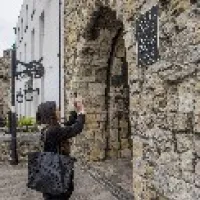
Ancient History

Ancient History and Archaeology

Ancient History and Archaeology with Year Abroad

Ancient History and History

Ancient History and History with Year Abroad

Ancient History with Year Abroad

English
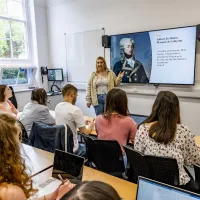
English and History

English and Modern Languages
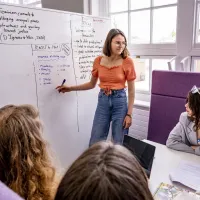
English Language and Literature
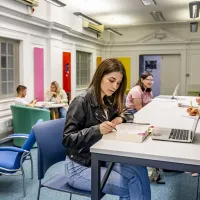
English with Creative Writing
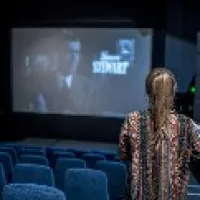
Film and English

Film and English with Year Abroad

Film and History

Film and History with Year Abroad

History

History and Modern Languages

History with Year Abroad

Liberal Arts

Modern History and Politics

Modern History and Politics with Year Abroad
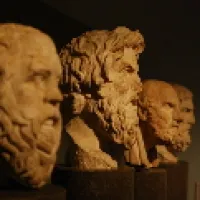
Philosophy and English

Philosophy and English with Year Abroad

Philosophy and History


